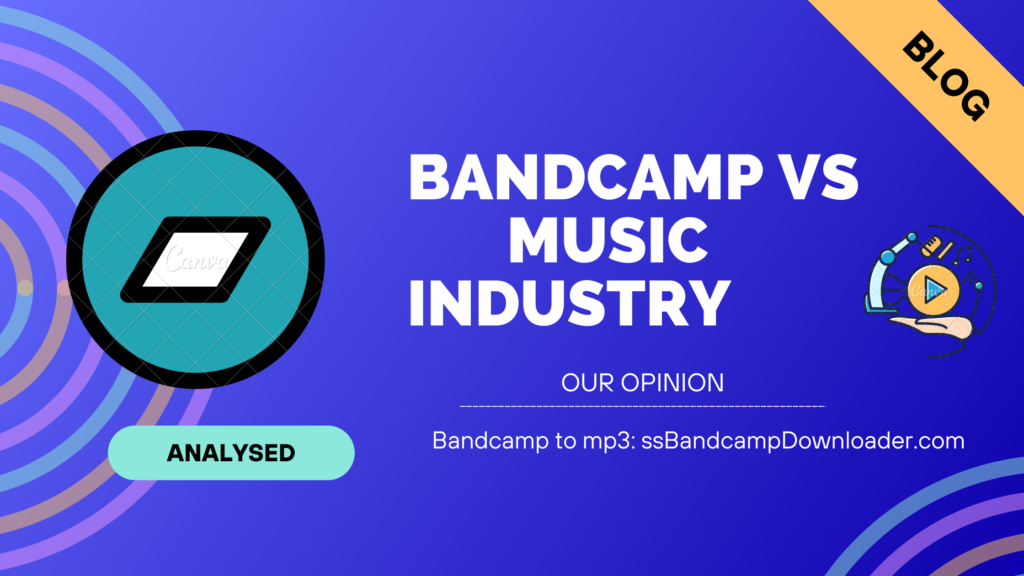In an era where the music industry is constantly evolving, one platform has emerged as a game-changer: Bandcamp. This article delves into the profound impact that Bandcamp, a digital music distribution platform, has had on the music landscape.
Bandcamp’s rise signifies a shift towards empowerment for independent musicians, providing them with a direct-to-fan model that challenges traditional record labels.
This introduction sets the stage for an exploration of how Bandcamp is disrupting the music industry, not only by reshaping revenue distribution but also by fostering vibrant artist-fan communities and opening doors to niche markets. Discover how Bandcamp is redefining the music industry as we know it.

The Rise of Independent Artists
In the music industry’s ever-evolving landscape, independent musicians have found a powerful ally in Bandcamp. This section will delve into how the platform has become a catalyst for the rise of independent artists, reshaping the traditional music industry hierarchy.
Bandcamp’s Empowerment of Independent Musicians At its core, Bandcamp empowers independent musicians by providing them with a platform to showcase their work directly to the world.
Unlike the conventional music industry, where artists often rely on record labels to reach their audience, Bandcamp allows musicians to take control of their careers.
Independent artists can easily create and customize their profiles, upload their music, set their own pricing, and even determine the format of their releases, whether it’s digital mp3 downloads, physical CDs, or vinyl records.

Case Studies of Successful Independent Artists To illustrate Bandcamp’s impact, let’s look at some real-world success stories. Artists like Chance the Rapper, Amanda Palmer, and Car Seat Headrest have all used Bandcamp as a launching pad for their careers.
They leveraged the platform’s flexibility and direct-to-fan approach to build dedicated fan bases and gain recognition without the need for major record labels.
These case studies highlight how Bandcamp has become a springboard for independent musicians to achieve their artistic visions and connect with their audiences on their terms.
Comparison with Traditional Record Labels Traditionally, record labels have played a dominant role in shaping an artist’s career. They provide financial support, marketing resources, and distribution networks, but often at the cost of creative control and a significant share of the revenue.
Bandcamp challenges this model by offering a more artist-friendly alternative. Independent musicians can maintain creative autonomy while directly engaging with their fan base.
This section will explore the advantages and disadvantages of both approaches, shedding light on why an increasing number of artists are opting for Bandcamp’s independent route over traditional record label deals.
Direct-to-Fan Model
One of the cornerstones of Bandcamp’s disruptive influence on the music industry is its direct-to-fan model. In this section, we’ll delve into how this approach works and the benefits it offers to both artists and their fans.
Explanation of Bandcamp’s Direct-to-Fan Approach At its essence, Bandcamp’s direct-to-fan model is a departure from the traditional music distribution model. It allows artists to establish a direct and unmediated connection with their fans.
When listeners discover an artist they love on Bandcamp, they can interact with them directly, without intermediaries like record labels or streaming platforms. This fosters a sense of community and closeness between musicians and their audience, a feature that distinguishes Bandcamp from other music platforms.
Benefits for Artists The direct-to-fan model provides a host of advantages for artists. Firstly, it offers greater control over their creative work, allowing them to set their own pricing, release schedules, and merchandise offerings.
This control extends to data analytics, enabling artists to understand their audience better and tailor their strategies accordingly. Moreover, Bandcamp’s fee structure is transparent and artist-friendly, ensuring that a significant portion of the revenue goes directly to the creators, supporting their livelihoods and future projects.
Benefits for Fans Fans, too, reap substantial benefits from this model. They enjoy a more intimate connection with the artists they support, often gaining access to exclusive content, early releases, and merchandise.
Furthermore, Bandcamp’s fan-friendly features, such as the ability to stream music before purchasing and the option to pay more than the listed price (if they choose to support the artist further), enhance the overall listening experience. This direct interaction fosters a sense of loyalty and engagement that is less common on traditional streaming platforms.
Fair Revenue Distribution
Bandcamp’s approach to revenue distribution stands in stark contrast to many mainstream streaming platforms. In this section, we’ll delve into how Bandcamp ensures fair compensation for artists and why this is a pivotal aspect of its disruption in the music industry.
Comparison of Bandcamp’s Revenue Model with Streaming Platforms Bandcamp’s revenue model is fundamentally different from that of most streaming giants. Unlike platforms that pay artists based on fractions of a cent per stream, Bandcamp allows artists to set their own prices for music and merchandise.
This means that when fans make a purchase, a substantial portion of the revenue goes directly to the artist, bypassing the need for millions of streams to earn a decent income. This comparison highlights Bandcamp’s commitment to equitable compensation for musicians.

How Bandcamp Ensures Fair Compensation for Artists Bandcamp’s transparent and artist-centric approach to revenue distribution is a breath of fresh air for musicians. The platform deducts only a reasonable transaction fee for processing payments and hosting music.
This means that the lion’s share of the revenue generated from sales goes directly to the artists. Additionally, Bandcamp does not employ the complex algorithms and payout structures that often leave artists on traditional streaming platforms uncertain about their earnings. Instead, it provides artists with real-time data on sales, allowing them to track their income accurately.
Testimonials from Artists Regarding Earnings on Bandcamp To substantiate Bandcamp’s commitment to fair compensation, it’s beneficial to include testimonials from artists who have experienced success on the platform.
Quotes and anecdotes from musicians who have seen their incomes grow substantially through Bandcamp can provide firsthand accounts of the platform’s impact.
These testimonials can range from indie artists to well-known acts who have chosen Bandcamp as a primary distribution channel due to its revenue transparency and artist-friendly policies.
Community and Engagement
Bandcamp’s impact on the music industry extends beyond revenue distribution and independent artists; it also fosters a unique sense of community and engagement. This section explores how the platform encourages artist-fan interactions and builds a vibrant musical ecosystem.
The Role of Community-Building on Bandcamp Unlike traditional streaming platforms, Bandcamp places a strong emphasis on community-building. Artists can connect with their fans on a personal level, fostering a sense of belonging and loyalty.
This is achieved through features like artist updates, where musicians can share stories, updates, and behind-the-scenes content, making fans feel like part of the creative journey. Additionally, Bandcamp offers a comment section on each album and track, facilitating direct communication between artists and listeners.

Features That Encourage Fan Engagement Bandcamp’s user-friendly features contribute significantly to fan engagement. The platform allows artists to offer exclusive content, such as bonus tracks or early releases, to fans who purchase their music.
This incentivizes fans to support their favorite musicians directly. Moreover, Bandcamp’s messaging system enables fans to reach out to artists, fostering a direct and personal connection. These features contribute to a vibrant, engaged community of music enthusiasts.
Impact on Artist-Fan Relationships Bandcamp’s approach to artist-fan relationships has transformed the way musicians and listeners interact. The platform has democratized access to artists, allowing fans to express their appreciation directly through comments, messages, and purchases.
This direct interaction deepens the bond between musicians and their audience, creating a sense of mutual appreciation and support. In turn, this level of engagement has propelled independent artists to new heights, as their dedicated fan base becomes a driving force behind their success.
Discoverability and Niche Markets
Bandcamp’s innovative approach to music distribution doesn’t stop at empowering independent artists and fostering community; it also excels in discoverability and catering to niche markets. This section delves into how the platform promotes music discoverability and gives niche genres and artists a place to thrive.
Explore How Bandcamp Promotes Discoverability Discovering new music can be a daunting task in the digital age, with an overwhelming amount of content available. Bandcamp, however, stands out by offering an array of discovery tools.
The platform’s recommendation algorithms, user-generated playlists, and “Discover” section help users stumble upon new artists and genres they might not have encountered otherwise. Bandcamp’s user-friendly interface encourages exploration, making it easier for listeners to find unique and undiscovered music.
Niche Genres and Artists Finding Success Bandcamp’s commitment to inclusivity means that it welcomes artists from a wide range of genres, including those that might be considered niche or unconventional.
Genres like experimental jazz, lo-fi indie rock, and avant-garde electronic music have found dedicated audiences on the platform. By providing a space for these niche genres to thrive, Bandcamp has effectively democratized music, ensuring that even the most specialized artists can reach their intended audience.
Data and Statistics Supporting This Trend Backing up the claim of Bandcamp’s impact on discoverability and niche markets with data can add depth to this section.
Statistics on the growth of niche genres and the number of artists finding success in these spaces can illustrate how Bandcamp’s ecosystem has enabled these artists to flourish.
It’s worth highlighting specific examples of artists who have gained recognition and support within their niche thanks to the platform’s discoverability features.
The Role of Bandcamp Fridays
Bandcamp Fridays have become a significant part of the platform’s identity, and they play a pivotal role in its disruption of the music industry. In this section, we’ll examine what Bandcamp Fridays are and how they impact both artists and fans.
Explanation of Bandcamp Friday Initiative Bandcamp Fridays are a recurring event where the platform waives its revenue share on all sales, allowing artists to receive a larger portion of the proceeds.
This initiative typically takes place on the first Friday of each month, although there have been special Bandcamp Fridays on occasion. During these days, when fans purchase music or merchandise, nearly all of the money goes directly to the artists, making it an immensely artist-friendly event.
Impact on Artist Revenue and Fan Engagement Bandcamp Fridays have a profound impact on artist revenue. By eliminating the platform’s usual revenue share, musicians earn more from each sale, which can be a significant boost to their income.

This financial support is especially crucial for independent artists, as it helps sustain their careers and fund future projects. Additionally, Bandcamp Fridays encourage fan engagement by giving fans an extra incentive to purchase music and support their favorite artists on these designated days.
Reception and Feedback from the Music Community To provide a well-rounded view of the significance of Bandcamp Fridays, it’s essential to include feedback and testimonials from artists and fans. Many artists have expressed their gratitude for these events, citing how they’ve positively impacted their livelihoods.
Fans, too, appreciate the opportunity to directly support artists and often participate enthusiastically in Bandcamp Fridays. Including real-life stories and quotes can offer a firsthand perspective on the importance of these events within the music community.
Challenges and Criticisms
While Bandcamp has made significant strides in reshaping the music industry, it’s not without its share of challenges and criticisms. This section will provide a balanced view by addressing some of the issues and concerns associated with the platform.
Addressing Criticisms and Concerns Bandcamp, like any platform, is not immune to criticism. Some artists and users have raised concerns about the limited discoverability of content on the platform, especially in comparison to major streaming services.
Others have questioned Bandcamp’s ability to provide artists with consistent income, particularly for those in niche genres or with smaller fan bases. It’s essential to acknowledge these criticisms and address them objectively, demonstrating an awareness of the platform’s limitations.
How Bandcamp Is Addressing These Issues Bandcamp has not been complacent in the face of criticism. The platform has continuously worked to improve discoverability, with features like recommendations, user-generated playlists, and the “Discover” section.
Bandcamp has also launched initiatives like Bandcamp Fridays to directly support artists financially. It’s crucial to highlight these efforts as evidence of the platform’s commitment to addressing concerns and enhancing the user experience.
Balanced View of the Platform’s Limitations While Bandcamp has undoubtedly disrupted the music industry, it’s essential to maintain a balanced perspective. The platform may not be the ideal choice for every artist or listener.
For some musicians, the direct-to-fan model may require significant effort in terms of marketing and engagement. Additionally, Bandcamp’s emphasis on album releases might not align with the consumption habits of listeners who prefer single tracks. By presenting a well-rounded view of the platform’s limitations, readers can better understand both its strengths and weaknesses.
Future of the Music Industry
As we explore how Bandcamp is disrupting the music industry, it’s crucial to consider the platform’s potential impact on the industry’s future. In this section, we’ll speculate on the long-term implications of Bandcamp’s presence and how it has influenced industry trends.
Speculating on the Long-Term Impact of Bandcamp Bandcamp has already demonstrated its ability to empower independent artists, foster community, and reshape revenue distribution. Speculating on its long-term impact, it’s conceivable that the platform will continue to be a driving force behind the rise of independent music.
We can anticipate that more artists will embrace Bandcamp’s direct-to-fan model, reducing their reliance on traditional record labels and giving rise to a more artist-centric music industry.
How Bandcamp Has Influenced Industry Trends Bandcamp’s influence extends beyond its platform, as it has influenced broader industry trends. The success stories of artists who have thrived on Bandcamp have inspired musicians to explore alternative distribution models.
This shift towards artist empowerment and transparency in earnings has prompted conversations within the music industry about the need for fair compensation and greater control over creative work. We can anticipate that these discussions will continue to shape the industry’s future.
Potential Changes in the Music Landscape Considering Bandcamp’s role in promoting niche genres and artists, we can foresee a more diverse and inclusive music landscape in the future. Niche genres that might have struggled for recognition in the past could find larger and more dedicated audiences through Bandcamp’s discoverability features.
Additionally, the platform’s commitment to fair revenue distribution may encourage other music platforms to reevaluate their own compensation models, potentially leading to more equitable industry standards.
Conclusion
In conclusion, Bandcamp’s disruptive influence on the music industry is undeniable. The platform empowers independent artists, fosters direct connections between musicians and fans, and champions fair revenue distribution. Bandcamp Fridays have become a celebrated tradition, further supporting artists. While challenges and criticisms exist, the platform’s commitment to improvement is evident.
Bandcamp has not only reshaped the industry but also influenced trends and discussions about artist empowerment and compensation.
Looking ahead, Bandcamp’s impact on the music landscape promises a more diverse, equitable, and artist-centric future. As artists and fans continue to embrace this transformative platform, Bandcamp remains a driving force in the evolving world of music.
FAQs
Bandcamp is a digital music distribution platform that allows artists to directly upload and sell their music to fans. Unlike mainstream streaming services, Bandcamp offers artists control over pricing, format, and merchandise sales. It fosters direct artist-fan connections, promoting a sense of community.
Yes, there are fees. Bandcamp takes a percentage of sales for digital downloads and merchandise. However, on Bandcamp Fridays, the platform waives its revenue share, allowing artists to keep a more significant portion of the proceeds.
You can discover music on Bandcamp through various means. The platform offers recommendation algorithms, user-generated playlists, and a “Discover” section to help you explore new artists and genres. Additionally, following artists you like and exploring their followers’ profiles can lead to exciting discoveries.
Yes, you can stream music for free on Bandcamp. Many artists offer the option to stream their tracks before making a purchase decision. Bandcamp also allows artists to offer free downloads of their music if they choose to do so.
No, Bandcamp hosts a wide range of artists, from independent musicians to well-known acts. While it has gained popularity among independent artists, established musicians also use the platform to connect directly with their fans and offer unique content. Bandcamp welcomes artists from all backgrounds and genres.

One Comment
Comments are closed.